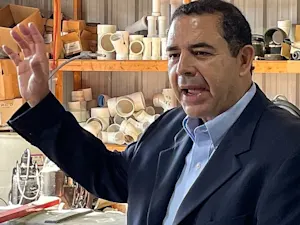
Vaccine War Erupts as RFK Jr. Axes CDC Panel
CDC′s Roybal campus in Atlanta, GA. Photo by James Gathany and courtesy of the Centers for Disease Control and Prevention. Public domain.
On a quiet Monday morning, 17 experts on one of the most influential health advisory panels in the U.S. government received the same email. No warning. No phone call. Just a message with their immediate termination, signed by Health Secretary Robert F. Kennedy Jr.
And just like that, the CDC's Advisory Committee on Immunization Practices (ACIP) was gone.
A Sudden Purge, and a Nation Left Guessing
Kennedy's decision to gut the ACIP, the group responsible for shaping national vaccine policy, landed like a thunderclap across the political spectrum.
In his June 9 op-ed in The Wall Street Journal, Kennedy accused the committee of being a "rubber stamp for any vaccine," citing "persistent conflicts of interest" as the rationale behind the mass firings, according to Politico.
The response was swift — and fierce.
Senator Susan Collins (R-Maine), when told about the move by reporters, said, "I did not know that had happened. It must have been very recent. I don't know who serves on those committees but it seems to be excessive to ask for everybody's resignations," according to Politico.
Even Senator Bill Cassidy (R-Louisiana), who voted to confirm Kennedy after receiving verbal assurances that ACIP's structure would remain intact, admitted he was concerned about what comes next.
For the 17 fired members, some of whom had gone through years-long vetting processes and rigorous conflict-of-interest disclosures, the decision wasn't just abrupt — it was personal.
A Power Play With High Stakes
The Advisory Committee on Immunization Practices may sound like bureaucratic white noise, but its influence is anything but boring. ACIP recommendations inform the CDC's national vaccine schedule, a blueprint that determines what shots are required for school, what insurers cover, and what pediatricians recommend to our nation's kids.
By dismissing all 17 members and naming just eight replacements, Kennedy hasn't just shaken up the roster — he's put the entire system in limbo. According to U.C. Law Professor Dorit Reiss, the current setup may not even allow for a quorum to conduct votes, putting the panel's June 25–27 meeting at risk unless ex-officio members are deputized.
Kennedy's new picks? A mix of pandemic-era contrarians, vaccine skeptics, and ideological allies. Among them are:
- Dr. Robert Malone, a physician and researcher known for his skepticism of mRNA vaccines, has publicly embraced the "anti-vaxxer" label, as reported by Ars Technica.
- Martin Kulldorff, co-author of the Great Barrington Declaration, which questioned the effectiveness of lockdowns and drew criticism from many public health officials.
- Retsef Levi, who has called for a halt to COVID mRNA vaccinations, citing what he describes as "indisputable" evidence of harm, according to NPR.
Kennedy insists that all new members are committed to "evidence-based medicine, gold-standard science, and common sense," according to NPR.
However, other public health advocates are sounding alarm bells. Dr. Bruce Scott, president of the American Medical Association, said the ACIP "has been a trusted national source of science- and data-driven advice and guidance on the use of vaccines to prevent and control disease," according to Time. He added, "Today's action to remove the 17 sitting members of ACIP undermines that trust and upends a transparent process that has saved countless lives. With an ongoing measles outbreak and routine child vaccination rates declining, this move will further fuel the spread of vaccine-preventable illnesses."
A Broken Promise?
Kennedy's confirmation to the nation's top public health post came with political friction from the start. Known for his history of vaccine skepticism, Kennedy repeatedly insisted during his Senate hearings that he was "not anti-vaccine" but "pro-safety," according to Time.
This public stance convinced many lawmakers that the CDC's vaccine advisory infrastructure would be left intact.
However, the June 9 announcement seems to contradict those commitments. Senator Cassidy, who supported Kennedy's confirmation, now says the Health Secretary promised not to alter the process, not the people — a distinction many see as legalistic hairsplitting that undermines the spirit of that pledge.
If Cassidy and Collins feel blindsided, they're probably not alone. Inside the CDC itself, open protests erupted. Staffers called for Kennedy's resignation, denounced the ACIP purge as "scientific censorship," and accused the Secretary of being a "domestic health threat," according to CBS News reports cited by Ars Technica.
Will Vaccine Policy Be Politicized?
Kennedy maintains that this overhaul is about "putting the restoration of public trust above any pro- or anti-vaccine agenda," according to Politico.
But some critics aren't buying it.
The Wall Street Journal editorial board, the very publication that ran Kennedy's original op-ed, found there was no evidence the prior members were corrupt and, according to Ars Technica, concluded that Kennedy's claims of conflict of interest "proved to be nothing."
Dr. Helen Chu, a recently dismissed ACIP member and infectious disease specialist at the University of Washington, said, "It is likely that it will send vaccine recommendations in a completely different direction than where they've been for the past 60 years," according to Ars Technica. "I'm very worried. ACIP is the model for the rest of the world in terms of how you carefully deliberate and are thoughtful and look at all of the data. ... To disband what is often considered an international gold standard for vaccine policy, and to disband it in this way is just sending a very clear message to the rest of the world."
What Happens Next?
The ACIP's next scheduled meeting looms at the end of June, but with only eight of 19 voting members currently appointed, the committee may not be able to legally function unless Kennedy accelerates further appointments or temporarily taps federal officials from other Health and Human Services branches.
Meanwhile, the American Medical Association has passed an emergency resolution calling for Kennedy to reverse the firings — and, if he doesn't, to consider creating an independent advisory board to uphold vaccine policy standards. "We do not want to be on the wrong side of history," said Dr. Jason Goldman, president of the American College of Physicians, during the AMA's annual meeting in Chicago, as reported by Ars Technica.
For Kennedy, this marks a pivotal moment. Supporters see it as an effort to bring transparency to a flawed system, while critics argue it risks undermining a process they believe has served the public well.
For many Americans — especially in a country still navigating post-pandemic skepticism and declining childhood vaccination rates — it's the uncertainty that raises the most concern.
References: RFK Jr. names new slate of vaccine advisers after purging CDC panel | RFK Jr. to fire all members of the CDC's vaccine advisory committee | What to Know About RFK Jr. Removing All Experts From CDC Vaccine Advisory Committee | After RFK Jr. fires vaccine advisors, doctors brace for blitz on childhood shots | RFK Jr. announces 8 appointees to CDC vaccine panel—they're not good






















